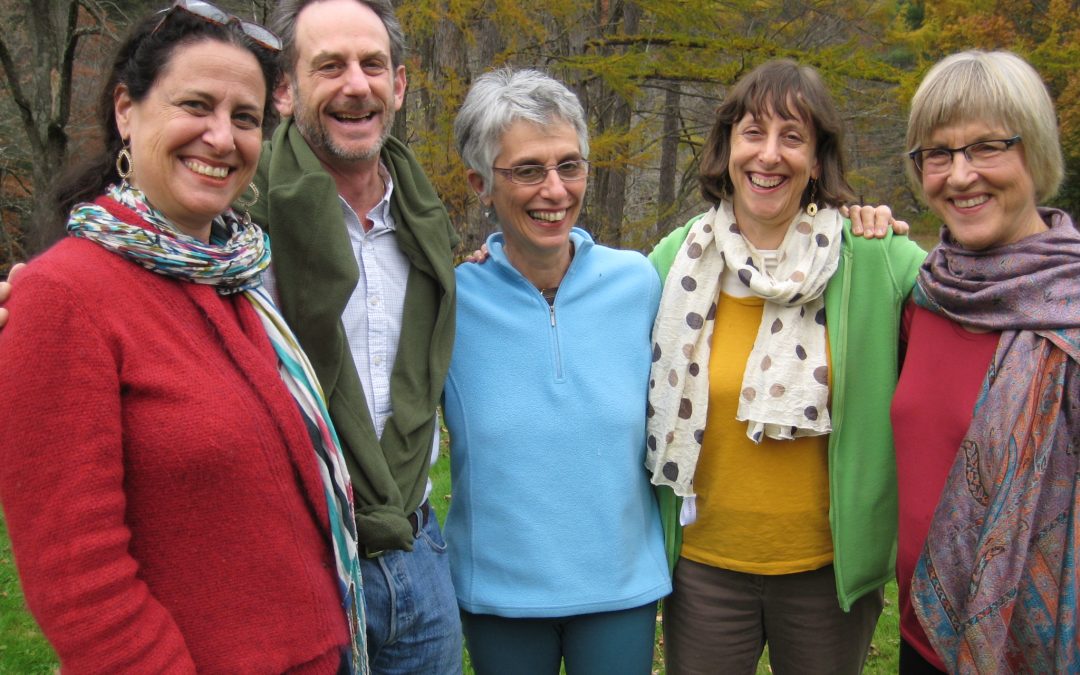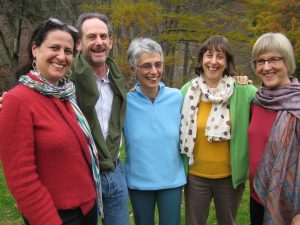
Feb 4, 2019 | by Rabbi Lisa Goldstein, Former Executive Director, Institute for Jewish Spirituality
 This month begins IJS’s 20th anniversary year! I was not personally present at the very beginning in 1999 when Rachel Cowan (z”l) and Nancy Flam brought together an extraordinary group of spiritual teachers and seekers in a process of sharing and learning that became the Institute for Jewish Spirituality. So much has changed and evolved since then.
This month begins IJS’s 20th anniversary year! I was not personally present at the very beginning in 1999 when Rachel Cowan (z”l) and Nancy Flam brought together an extraordinary group of spiritual teachers and seekers in a process of sharing and learning that became the Institute for Jewish Spirituality. So much has changed and evolved since then.
But one thing that has not changed has been the core values that undergird our work. Like all values, they are aspirational. Like all intentions, we fall short occasionally and recommit ourselves to them anew. As we take stock of the last 20 years and begin the process of reflection and rededication towards the next 20, I wanted to share these powerful values with you in hopes that they inspire you as much as they inspire me.
Institute for Jewish Spirituality: Our Guiding Principles
Shiviti Adonai lenegdi tamid: I strive to cultivate an awareness of God in every moment.
We seek a spiritual practice that wakes us to God’s reality in all aspects of our lives. The whole earth is full of God’s glory!
Tzelem Elohim: The Divine Image
We affirm and strive to reflect the divine and infinite potential in each human being.
Kehilla Kedosha: Holy Community
Creating and maintaining a safe, intentional community allows for deep listening to ourselves and to others, and opens us for healing, connection and insight.
Im eyn ani li mi li?: If I am not for myself, who will be for me?
Jewish leaders best serve and inspire their communities when they cultivate and refine their own spiritual lives–you can’t give what you don’t have.
La aleycha hamlachah ligmor: You do not have to finish the work, but neither are you free to desist from it
Spiritual growth is a life-long process that requires ongoing commitment, practice and guidance.
Tikkun HaNefesh and Tikkun Olam
We understand that our work to cultivate awareness leads inexorably to acts of kindness and justice.
Ki tavo chochmah b’libeycha, v’da’at l’nafsehcha yinam: For wisdom will enter your mind and knowledge will delight you
While we inherit a unique religious tradition, we are open to, benefit from, and integrate wisdom from other traditions.
Redeeming Sparks of Language
We are committed to helping people connect their traditional Jewish God, language, and ritual with their authentic inner experience in order to nurture and expand their sense of experiencing of God as Jews.
Mechadesh b’chol yom tamid ma’aseh beresheet: The world is constantly created anew
We believe in the power of Teshuva – the capacity of Jews and Judaism to change and grow and thereby be of greater service to themselves and to the world.
Jun 7, 2017 | by Rabbi Lisa Goldstein, Former Executive Director, Institute for Jewish Spirituality

Early this spring, I traveled to California to celebrate my father’s 90th birthday. Members of my extended family from as far away as Fiji and New Zealand came to gather, and I was amazed by the connections I saw between cousins who so rarely have the opportunity to meet in person, the instant bonds of love that we offered—even though we live such different lives!
One of my favorite interactions I witnessed that day was between my father, , and a visiting cousin, who just turned seven. This young boy was telling my father all about the planets and the solar system, which he was learning about in school, and found exciting and fascinating. My father, an astronomer who has been studying the planets since the 1960s, could certainly—in today’s “I know more than you!” world—have brushed this little cousin off. Did he need a little boy to tell him about the retrograde rotation of Venus, or the rings of Saturn, things he himself had discovered? Of course not!
But he did. He listened to this little cousin, as if the way he saw the planets and the stars was the most interesting thing in the whole world to him. And only when he knew that learning from him would bring this cousin even more joy and excitement did he begin to tell him about his own ground-breaking work.
The Psalmist teaches us that the world will be built through chesed (Psalm 89). But what, as we ask in our Tikkun Middot course, is so great about the middah of chesed that it, among all others, will build the worlds?
Chesed is one of the few mitzvot in the Mishnah with no minimum requirement for it to “count.” Rabbi Shlomo Wolbe writes, “A nice word, a smile – these can give new life to someone who has given up on himself! A word of encouragement can bring joy. These are such small things [yet so significant!]”
To build our daily worlds through a lens of lovingkindness is to approach each act we do with a perspective of love. Not to ask: how might I make this moment better? But to ask: How might I relate to this moment—as it already is—with love?
How might I hold myself with love?
I hope the practices enclosed in this month’s letter give you some space to find your own way to build your own world with love.
May 8, 2013 | by Rabbi Lisa Goldstein, Former Executive Director, Institute for Jewish Spirituality

I have a very exciting announcement to make.
But first, let me set the stage. We have long believed that cultivating mindful Jewish leaders could have a profound and even transformational impact on Jewish communal life. However, one of the persistent questions we have struggled with has been how to help alumni of our cohort programs transmit the practices that we have found so personally meaningful to their communities who are also seeking. The obstacles are many: overwhelming busy-ness, a lack of confidence in teaching the practices, Jewish organizational culture, lack of support, just to name a few.
Over the years, we have developed various tools to help address these obstacles. Starting this fall, we will have a new one to add to our repertoire.
The John Templeton Foundation has given us a major grant to support an innovative, national program to promote character development through mindfulness and tikkun middot practice in targeted Jewish communities led by Institute-trained rabbis, cantors, educators, mindfulness teachers, and community leaders. Over the next three years, we will work with 28 Jewish communities to bring a mindful approach to cultivating desirable behaviors or character traits (such as generosity, patience, truth-telling and humility) into the culture of these communities.
There are three significant innovations to this program. The first is that we will be providing training to help leaders bring a specific practice to their communities in a way that reflects the unique culture and realities of that particular community. Participants in the program will be given curricula, in-person trainings, regular webinar support and targeted consultations, all with the support of the other members of the cohort. Secondly, we will be exploring what happens when we make a systemic connection between strengthening individual character development and communal norms and culture. This will give us the opportunity to learn more about how transformation works along the spectrum of change within an individual, in interpersonal relationships, in institutions and in society at large. And thirdly, we will be pioneering a new approach to mussar that is grounded in mindfulness practice.
Rabbi Marc Margolius will be the director of the program. For more information, please visit the program page.
That a non-Jewish foundation with the clout of the Templeton Foundation has decided to invest in our exploration is just thrilling. We are hopeful that this will significantly improve the tools we can offer our alumni in helping to revitalize Jewish life.
For more information on the Templeton Foundation’s work, please click here.

 This month begins IJS’s 20th anniversary year! I was not personally present at the very beginning in 1999 when Rachel Cowan (z”l) and Nancy Flam brought together an extraordinary group of spiritual teachers and seekers in a process of sharing and learning that became the Institute for Jewish Spirituality. So much has changed and evolved since then.
This month begins IJS’s 20th anniversary year! I was not personally present at the very beginning in 1999 when Rachel Cowan (z”l) and Nancy Flam brought together an extraordinary group of spiritual teachers and seekers in a process of sharing and learning that became the Institute for Jewish Spirituality. So much has changed and evolved since then.

